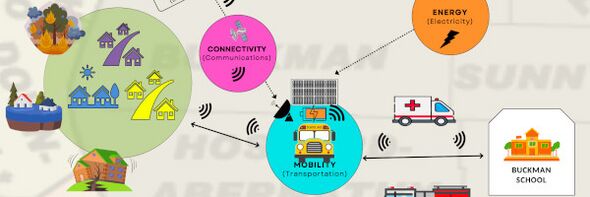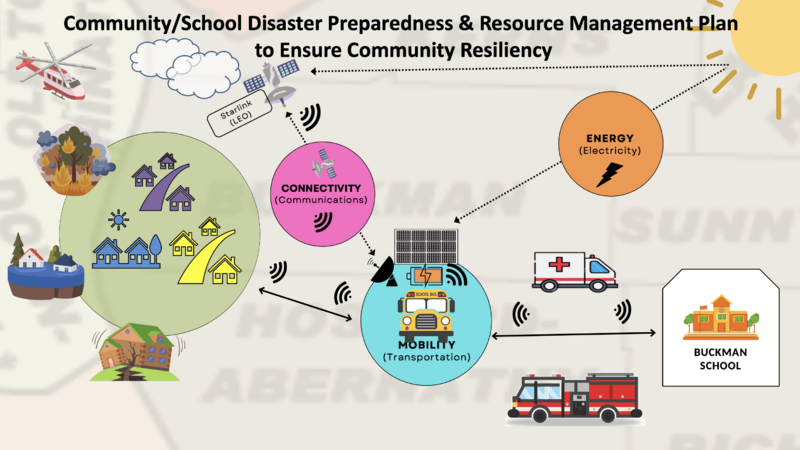CIVIC school HUBS: Difference between revisions
No edit summary |
No edit summary |
||
| Line 1: | Line 1: | ||
{{Infobox project | {{Infobox project | ||
|image=Buckman | |image=Buckman Resilience600.jpg | ||
|imagecaption=Schools ...Resilience HUBS? | |imagecaption=Schools ...Resilience HUBS? | ||
|team-members=Portland Public Schools, Mulnomah County, Metro, Link Oregon, Georgia Tech, Portland State University | |team-members=Portland Public Schools, Mulnomah County, Metro, Link Oregon, Georgia Tech, Portland State University | ||
| Line 10: | Line 10: | ||
|summary=NSF CIVIC grant to incubate the Federal School Infrastructure Toolkit for more resilience Community services. A pilot program with be developed with the BENSON school district in Portland, and woven into the urban/rural network of the Metro regional emergency response. | |summary=NSF CIVIC grant to incubate the Federal School Infrastructure Toolkit for more resilience Community services. A pilot program with be developed with the BENSON school district in Portland, and woven into the urban/rural network of the Metro regional emergency response. | ||
}} | }} | ||
[[File:Buckman Resilience.png|800px|center]] | |||
The Global Community Technology Challenge (GCTC) and Georgia Tech University (GTU) have received a National Science Foundation Planning Grant to conduct research with Portland Public Schools on a project: Schools as Community Resilience Hubs. The GCTC/GTU team will work closely with stakeholders that include Benson School District leaders, city and State government organizations, regional first responders, utilities organizations, and, most-importantly, members of the Benson School District community to develop a community-driven, socio-technical infrastructure to identify community emergency response and resiliency challenges. Together with stakeholders, we will evaluate current needs, strategize a plan to address the challenges, and develop a “digital twin” that models an individual school’s role as a community resilience node–as part of a larger community resilience network. The digital twin will provide a safe test bed on which to conduct what-if scenarios. These scenarios will involve a mix of people, processes, and technologies. As part of the planning phase, we will also research capital investment and longer-term operations funding to initiate, maintain, and expand the Resilience Network, initially to serve a single school district community, but eventually expanding more broadly. We will strive to integrate the needs of all community members and consider the roles of other stakeholders, available resources, and unique conditions that impact emergency response. The purpose of a resilience hub is to provide shelter, resources, connectivity, and timely information-sharing in preparation for and response to multiple potential natural and manmade disaster events. | The Global Community Technology Challenge (GCTC) and Georgia Tech University (GTU) have received a National Science Foundation Planning Grant to conduct research with Portland Public Schools on a project: Schools as Community Resilience Hubs. The GCTC/GTU team will work closely with stakeholders that include Benson School District leaders, city and State government organizations, regional first responders, utilities organizations, and, most-importantly, members of the Benson School District community to develop a community-driven, socio-technical infrastructure to identify community emergency response and resiliency challenges. Together with stakeholders, we will evaluate current needs, strategize a plan to address the challenges, and develop a “digital twin” that models an individual school’s role as a community resilience node–as part of a larger community resilience network. The digital twin will provide a safe test bed on which to conduct what-if scenarios. These scenarios will involve a mix of people, processes, and technologies. As part of the planning phase, we will also research capital investment and longer-term operations funding to initiate, maintain, and expand the Resilience Network, initially to serve a single school district community, but eventually expanding more broadly. We will strive to integrate the needs of all community members and consider the roles of other stakeholders, available resources, and unique conditions that impact emergency response. The purpose of a resilience hub is to provide shelter, resources, connectivity, and timely information-sharing in preparation for and response to multiple potential natural and manmade disaster events. | ||
Revision as of 18:04, November 22, 2022
| CIVIC school HUBS | |
|---|---|

| |
 Schools ...Resilience HUBS? | |
| Team Organizations | Portland Public Schools Mulnomah County Metro Link Oregon Georgia Tech Portland State University |
| Point of Contact | Stan Curtis Ann Marcus Jiri Skopek |
| Participating Municipalities | Portland OR |
| Sectors | Buildings Education Public Safety Wellbeing Broadband Resilience |
| Initiative | |
| Status | Ready for Public Announcement |
| Last Updated | April 22, 2025 |
Summary
NSF CIVIC grant to incubate the Federal School Infrastructure Toolkit for more resilience Community services. A pilot program with be developed with the BENSON school district in Portland, and woven into the urban/rural network of the Metro regional emergency response.
The Global Community Technology Challenge (GCTC) and Georgia Tech University (GTU) have received a National Science Foundation Planning Grant to conduct research with Portland Public Schools on a project: Schools as Community Resilience Hubs. The GCTC/GTU team will work closely with stakeholders that include Benson School District leaders, city and State government organizations, regional first responders, utilities organizations, and, most-importantly, members of the Benson School District community to develop a community-driven, socio-technical infrastructure to identify community emergency response and resiliency challenges. Together with stakeholders, we will evaluate current needs, strategize a plan to address the challenges, and develop a “digital twin” that models an individual school’s role as a community resilience node–as part of a larger community resilience network. The digital twin will provide a safe test bed on which to conduct what-if scenarios. These scenarios will involve a mix of people, processes, and technologies. As part of the planning phase, we will also research capital investment and longer-term operations funding to initiate, maintain, and expand the Resilience Network, initially to serve a single school district community, but eventually expanding more broadly. We will strive to integrate the needs of all community members and consider the roles of other stakeholders, available resources, and unique conditions that impact emergency response. The purpose of a resilience hub is to provide shelter, resources, connectivity, and timely information-sharing in preparation for and response to multiple potential natural and manmade disaster events.
